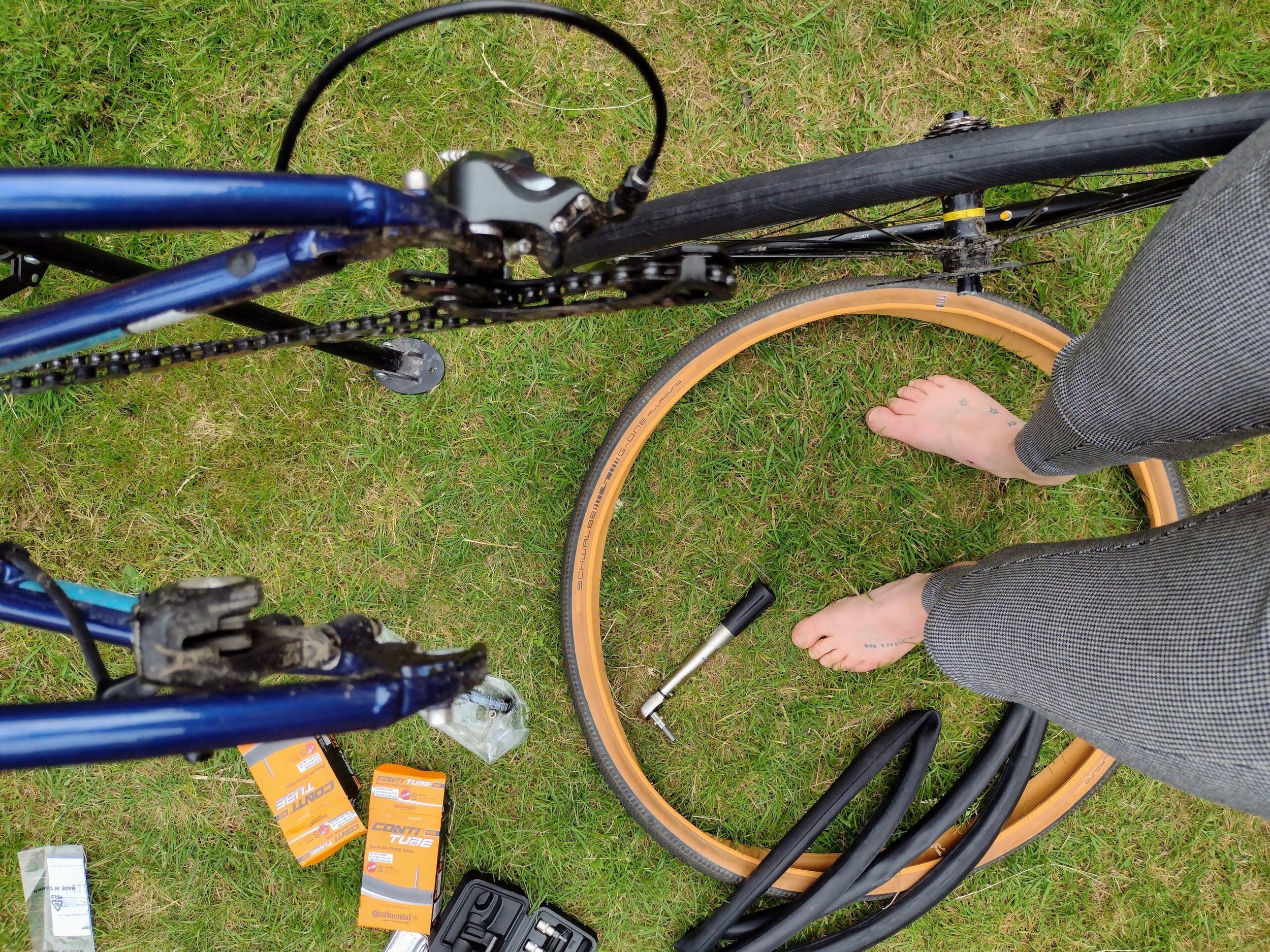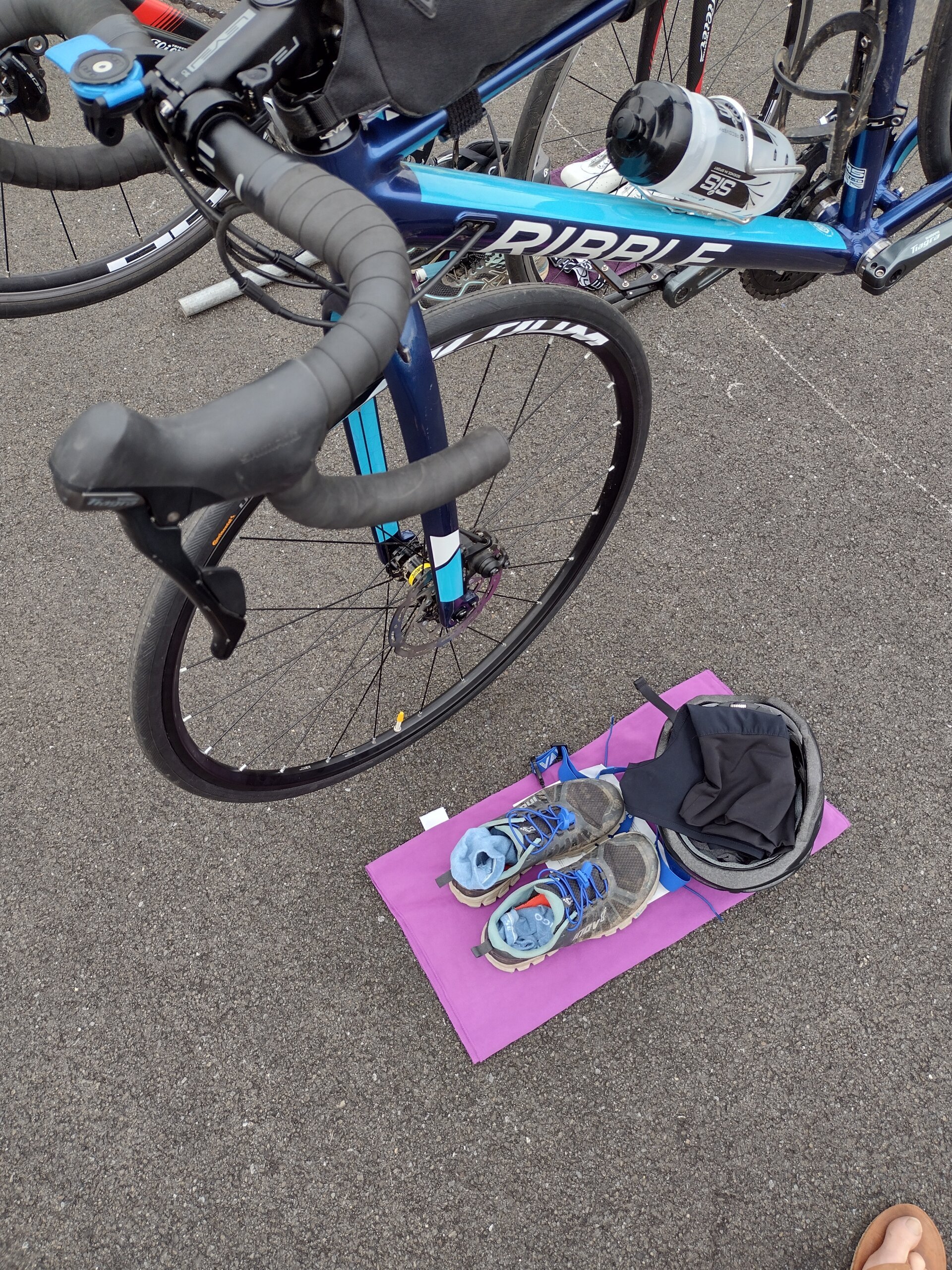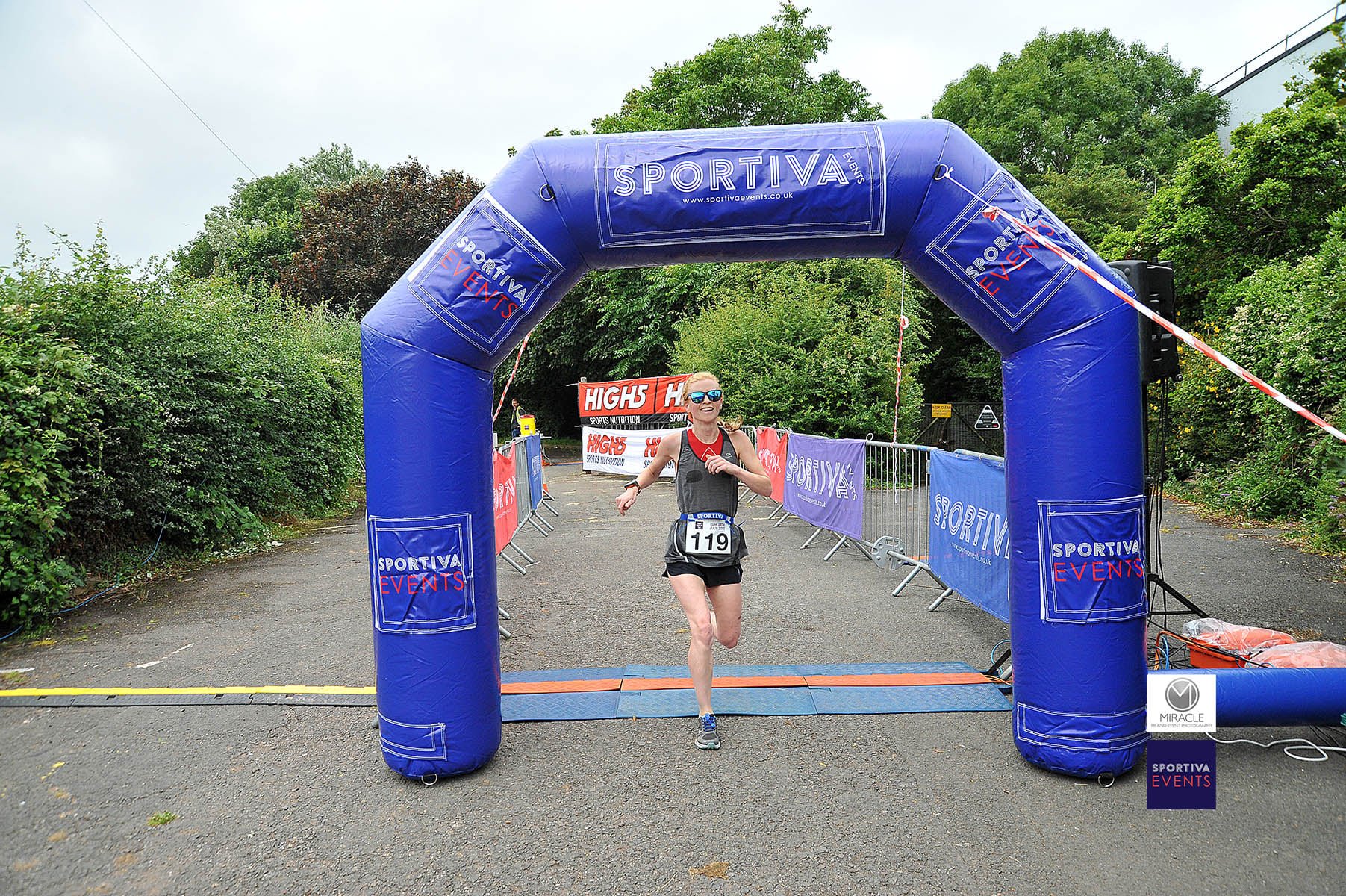I Did a Go Tri Triathlon and it was Excellent
In mid-July, YouTube showed me one of Lucy Charles-Barclay's videos about training for Ironman and something sparked in my head. I'm a lifelong cyclist, have been running for three years and have always loved swimming even though my swim career has been pretty stop-start depending on how close I live to a pool/warm ocean. Why not string them together?
I can't explain it, but within a couple of hours, I'd decided that Sportiva Events' Torbay Triathlon's Go Tri event in October 2021 would be an ideal place to start. Go Tri is a British Triathlon project aimed at getting more people into the sport, regardless of background. It's an event tagged onto the usual suspect distances of Sprint and Olympic, so you're part of a full triathlon event setup.
As I was about to book onto the triathlon, October suddenly looked really far away. That was the autumn edition and there was a summer edition, in two weeks time. Two weeks isn't very long but then neither were the distances: 300 m pool swim, 7.5 km bike, 2.5 km run. All distances that I could normally do with my eyes closed.
'I could just do it in a fortnight,' I hazarded to my partner.
'Go for it, no point in waiting,' he said.
I booked the summer edition for the 25th July.
Preparing for my first triathlon
The first thing I did to prepare was to actually read about triathlon. Like...I wasn't sure what order the disciplines were in, what 'transition' meant in the context, what to wear or anything else. As it transpires, reading about triathlon takes up quite a lot of time so perhaps my work suffered a little during the forthcoming week.

After digesting half the internet and, from a theoretical point of view, being prepared to enter the Olympics in the sport, I bought some elastic laces previously only known to me as 'laces for children who can't tie actual laces'. Elastic laces aren't just for kids, oh no. It's quite amazing how much less faff you have to deal with when you take laces out of the transition equation.
I sat in the garden on a sunny day and changed my tyres from 40 mm gravel tyres to 28 mm slicks. I figured I may as well make life easier for myself on the track. It was also the first time I'd changed a tyre because somehow, in the tens of thousands of miles I've cycled in my life, I've never had a puncture. Every day's a school day.

The main thing I did to prepare was read the race manual around 20 times, just in case I'd missed something crucial. Triathlons are simultaneously pretty straightforward and quite complicated. There are little things to know, like put your helmet on before you move your bike when switching from swim to cycle, and rack your bike before taking your helmet off when switching to the run.
Speaking of, a few days before the tri, I decided to do what's called a 'brick session', where you do a multi-sport session with a transition. I cycled for 7.5 km, shoved my bike into the garage at home then turned around and ran for 2.5 km. Now, 7.5 km is not far and I wasn't riding it particularly energetically. But the first 2k of the run felt like running through mud. The muscular transition from bike to run was so much harder than I thought it could be and I was massively relieved to have done it once before the tri, otherwise I might've wondered why the hell I couldn't run after a relatively short ride.
I packed my bag meticulously the night before because things are easily forgotten. Socks for after the swim, sunglasses, water bottle, goggles – don't forget the goggles – helmet, clothes for afterwards. PANTS. A triathlon is fundamentally like going on a holiday where you can only take hand luggage; everything must be essential and have its place.
Another part of my preparation was studying the maps of the velopark where the triathlon would take place. So I knew which way around the bike circuit I'd be riding and for how many laps, how the swim worked lane-wise and the exact course of the run. I even looked up the parking charges. All this homework meant, miraculously, that I was feeling relatively relaxed the morning of.
Triathlon day
My wave of the tri started at 9:30 am and the velopark was around a 30 minute drive away. I had little idea of how early I should get there but I'd seen the start list and knew that there were only 40 or so people in my event, the first of the day, so it was unlikely to be particularly busy, although other people in later events would be arriving too.
I got to the velopark around 8:30 and immediately went to sign in at registration, get my number and the other bumf: silicone swim hat, race belt (I bought this), race number sticker for bike seat post and my race number that I would wear on my back for the ride and front for the run. The race belt does away with safety pins and you can just swivel it around: nifty.
The event was buzzing with race crew and marshals, every single one happy to help, answer questions and give directions. In no time at all, I'd racked my bike and sorted out my transition area in what looked like a reasonably logical way.

I walked along the run course a little to where it split for the extra loop and then there was nothing else to do but work out how to put a swim cap on and not get too nervous.
At 9:20, I hovered around the back door to the swimming pool in my swimsuit, ankle timing chip, goggles and cap, chatting to the other people in my event, most of whom had never done a triathlon before either. When we were let onto poolside, there was some confusion about what order we should line up in as it was fastest swimmers first but nobody seemed to know what order the numbers went in. As a result, we all lined up more or less back to front and then underwent a confused, random shuffle like teenagers learning to line dance.
Those in the queue around me were all vibrating with nerves, adjusting goggles and talking about how they hadn't swum much in the last year. I laughed with the guys next to me as we discussed how regardless of how we do, it'll be a PB. From everything I've read, swimming is usually the most frightening part of a triathlon, something I imagine is amplified in open water swims. Pool swims have their own kind of downsides though, because you feel as though you're either going to be too slow for the person behind, requiring them to overtake at the end of a lane, or that you'll be too fast for the person in front, and need to tap them on their fast-moving feet to overtake them. Or worse, both.
I was starting around halfway through the group, so I could see how others were swimming. Some started with a bang, charging down the first lane and running out of steam in the second. We were swimming 12 lengths in a snake formation, so after the first two, you duck under the rope and do two in the next lane and so on and so forth. I knew better than to start fast. My aim was to swim the entire thing at an even pace because good swimming needs a swim warm up and that wasn't an option.
I swam a little faster than I had in pool practice which I feel was a pretty good effort as it took me 6 lengths just to get into it. I felt great getting out of the pool; the swim was definitely the unknown to me despite having swum twice a week for a few months. Cycling and running was far more my natural territory and running barefoot in only a swimming costume to transition wasn't as bizarre as one might think.
At my bike, I put on some loose running shorts and a top, clipped on my race belt, put on sunglasses and my helmet and did up my shoes in a moment thanks to my brilliant elastic laces. I grabbed my bike and headed out to the track where a marshal pointed to the line I had to pass to get on my bike. I was off!
I love track cycling and I hadn't done it since I was a child. Being able to do laps of a track is like a game; each time you get to know the track, its corners and almost imperceptible undulations better, so each lap you can improve. It's not so much a case of trying to chase people down because we all started swimming at different times, so it's pretty hard to work out what place you're in. Instead, it's just fun to try to improve on the lap before, pick a better line, brake less on the corners, work out the perfect speed at every moment, knuckling down for the headwind stretch.

After five laps, I jumped off the bike, racked it up, ditched my helmet and headed out of transition to run.
Now, I run all the time. In the two weeks before the tri, I'd run a half marathon, a 10 k and a few short runs around 5k. But this 2.5 k was one of the hardest runs I have ever done. My legs felt like they'd never run before and my lungs were on the brink of checking out entirely. As I ran towards the split, I felt like I was jogging rather than running. Then I looked at my watch and discovered I was actually running far faster than my usual 5k pace. The cognitive dissonance of a GPS watch telling you you're running fast but very much feeling like you're crawling along is not unlike sitting on a train sat at a station and watching the train next to you start moving, unsure of which is actually in motion.
I decided I'd better trust the watch and ease up, feeling my chest tighten. Could I walk? I couldn't walk, that would be ridiculous. It's only 2.5 k. Every marshal on the run was an absolute life saver. Each one called out supportive things and the penultimate was a boy of about 9, standing by himself in an adult's hi-vis gilet.
'Woooo! You've got this! You're doing SO WELL! You're nearly there, c'mon!'
He was a child. What an absolute hero.
The run route went up a hill (it wasn't a hill, it was a large lump in a field with an elevation of perhaps 2 metres) and around an astro-turf court before heading to the finish. I'm a big fan of a sprint finish and I often do them on training runs for fun. I absolutely did not have a sprint finish in me this time. It felt like a miracle I'd reached the end at all.
My partner's beaming face greeted me at the end as I staggered over towards him.
'How was it?'
'Oh good god, so hard.'

Go Tri
Go Tri is a perfect introduction to triathlon because it's specifically aimed at beginners to this multi-sport (although anyone can do it). It's not about the distance so much, it's about the pressure of being surrounded by people who know exactly what they're doing and feeling like I'm just getting in the way. Go Tri totally takes that pressure away because few, if anyone doing it has ever done one before and everyone is so friendly.
This one was organised by Sportiva Events but Go Tri is run all around the country, usually in conjunction with other triathlons.
The future
This triathlon was definitely a blend of Type 1 and Type 2 fun. Within about two minutes of finishing, the memory of how hard the run was began to fade and I started thinking, 'maybe I should've entered the sprint triathlon this afternoon...'
That's a good sign in any sporting endeavour.
I don't know what the future holds, but I suspect that will not be my last tri.